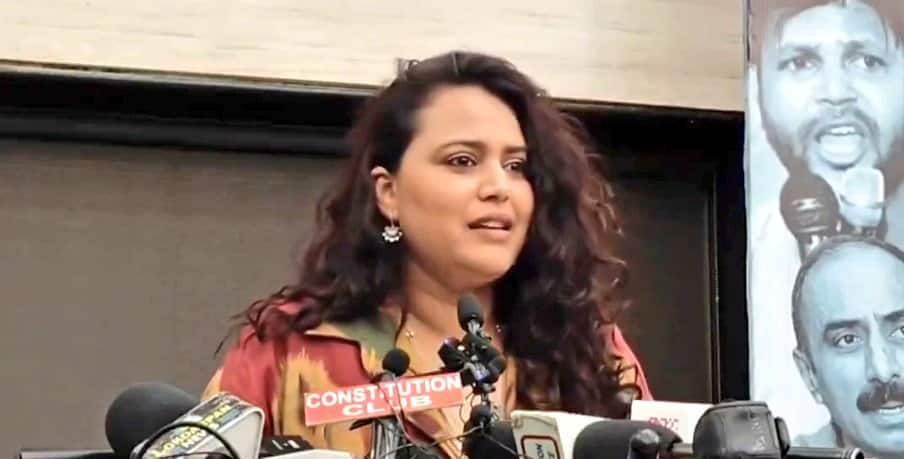'Time for Ganesh Puja with PM but not Umar Khalid's hearing': Swara Bhaskar questions CJI's priorities (WATCH)

In yet another bold move, Bollywood actress Swara Bhaskar has ignited controversy by publicly criticizing the Indian judicial system, drawing sharp attention to the prolonged imprisonment of former JNU student leader, Umar Khalid. In a video that has taken social media by storm, Swara questioned Chief Justice of India (CJI) DY Chandrachud’s priorities, asking why he could find time to attend Ganesh Puja
Swara’s fiery remarks come at a time when many, including prominent political figures such as Congress leader Digvijay Singh, are raising concerns about the treatment of Muslim activists like Umar Khalid, who has now been in jail for nearly four years. Khalid, accused of inciting the 2020 Delhi riots, has consistently denied the charges, yet his bail hearings have been marred by repeated delays.
In the viral clip, Swara lambasts the judiciary, accusing it of failing to uphold the principle of equality before the law. “Our country guarantees equality before the law, but what good is that if justice isn’t equally accessible to everyone?” she asks. The actress draws a stark contrast between her own privileged background—being born into an upper-caste, Hindu family, with the added advantages of an English-medium education and a Bollywood career—and the harsh reality faced by activists like Khalid.
Swara’s words highlight the deepening cracks in the justice system. She poignantly remarks, “You can call a Muslim a terrorist, but calling someone like me—a Hindu, educated in English-medium, and from an upper-caste family—a terrorist would be too much for our media,” underscoring the bias she believes exists in both the media and law enforcement.
Her sharp criticism didn’t stop there. Swara referenced an instance where a judge recused himself from hearing Khalid’s bail plea just before it was scheduled, leading to further delays. She fiercely questioned the judicial responsibility, asking, “Why are you not capable of hearing the case? Didn’t you study to become a judge? You get paid from our tax money, you live in government-provided homes, and yet you claim you don’t have time for this case?”
Perhaps the most explosive part of her commentary was aimed directly at the Chief Justice’s participation in religious ceremonies. Swara pointedly criticized the CJI’s involvement in Ganesh Puja with PM Modi while urgent cases, like Khalid’s, continue to languish in legal limbo. “What are you afraid of? Why don’t you have 20 minutes for justice?” she demanded, echoing frustrations that have long simmered among civil rights advocates.
This isn’t the first time Swara Bhaskar has taken a stand on such issues. Her consistent support for Umar Khalid, who was charged under the Unlawful Activities (Prevention) Act (UAPA), has made her a vocal critic of the system. Khalid’s case, deeply intertwined with protests against the Citizenship Amendment Act (CAA) and the National Register of Citizens (NRC), continues to attract widespread attention. Many have questioned whether the justice system operates at the same speed for all, or if some—particularly Muslim activists—are systematically denied fair treatment.
Umar Khalid’s story is a potent symbol of what Swara perceives as a broader injustice. Since his arrest in September 2020, Khalid has struggled to secure bail, even as many argue that “bail is the rule, and jail is the exception.” Swara emphasizes that while speeches about justice are plentiful, meaningful action remains elusive. “Justice is in doing, not in speaking. It is not enough to talk about justice; it must be seen in the way cases are handled,” she declares, demanding accountability from the nation’s highest judicial offices.
Swara’s criticism has reignited conversations about the judiciary’s role in cases involving minority communities. She boldly questioned the personal motivations of judges, speculating whether their reluctance to act was driven by fear or ambition. “What more do you want now? Do you want to become the Governor or get a seat in Rajya Sabha?” she asked, in a direct challenge to those overseeing such high-profile cases.